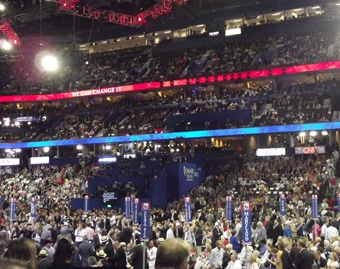
.- Jim Nicholson, former U.S. Ambassador to the Holy See, thinks that the Catholic vote remains an important force in modern politics and that more Catholics than in the past will vote for Romney and the Republican Party in the upcoming election.
“The Catholic vote is very relevant,” Nicholson told CNA on Aug. 29, “because there is a large number of Catholics” in the United States. The country currently has 55.6 million voting age Catholics and in swing states they make up 19 percent of the electorate, according to Georgetown’s Center for Applied Research in the Apostolate.
Nicholson, who has also served as U.S. Secretary of Veterans Affairs and Chairman of the Republican National Committee, explained that the U.S. has one of the largest Catholic populations in the world.
But, he qualified, the “Catholic vote is not a monolith.” And while “Catholics are traditionally Democrat,” Nicholson says that is changing.
He observed that Church leaders are strongly “imploring the people to look at the values espoused by the candidates for office and see how they align with Catholic values.”
“And in the case of the president, they don’t align at all,” he said. “There’s a mal-alignment.”
Nicholson predicted that there will be “a lot more Catholics voting for Governor Romney this election than you’ve seen vote Republican recently.”
In recent months, Church leaders in the U.S. have clashed sharply with the Obama administration over a federal mandate that requires employers to offer health insurance covering contraception, sterilization and abortion-inducing drugs, even if doing so violates their consciences.
Bishops from every diocese in the U.S. have spoken out against the mandate and the threat it poses to religious freedom. Dozens of colleges, hospitals and private businesses have brought lawsuits against the administration challenging the mandate.
Nicholson said that he was “heartened” by the political and religious diversity of those who have objected to the mandate and by “the intensity of the resistance of the Catholic bishops,” who have “really locked arms together in unanimity in their opposition to this.”
“And so have the leaders of many other religious institutions,” he added, pointing to Muslim, Jewish and Protestant groups and individuals who have joined with Catholics in protesting the mandate. This unity indicates the importance of the issue, he said.
“It’s all about the freedom of religion, the freedom of conscience, which is the first freedom in the Bill of Rights,” he noted.
Nicholson believes that the battle over the mandate “is far from over.”
“It’s a very egregious, unprecedented invasion of the freedom of the American people under our constitution,” he said.
“It’s not about birth control. It’s not about contraceptives,” he added. “It’s about freedom. It’s about a principle.”
No matter what the outcome of the election is, Nicholson believes that religious liberty will continue to be an important issue for the U.S. Church in the coming years.
Church leaders will be vigilant in watching for possible threats to religious freedom, realizing that this fundamental liberty cannot be taken for granted, he said.
“Some things you wouldn’t think imaginable a few years ago are now happening,” he explained, pointing to the recent Hosanna-Tabor v. EEOC Supreme Court case, in which the Obama administration tried to impose upon a church’s right to determine its own ministers.
“And the Supreme Court knocked that down, 9-0, which was encouraging,” he said. “But now we have these mandates that have come right on the heels of that.”
Nicholson said that he was “proud” of the Republican Party’s recent decision to adopt a plank on religious liberty into its official 2012 platform. He explained that the move is an “affirmation of the importance of religious freedom.”
“That shouldn’t even be controversial, but that’s where we are,” he said. “And that’s why it’s so important that people dig in their heels and start taking this stuff seriously.”



